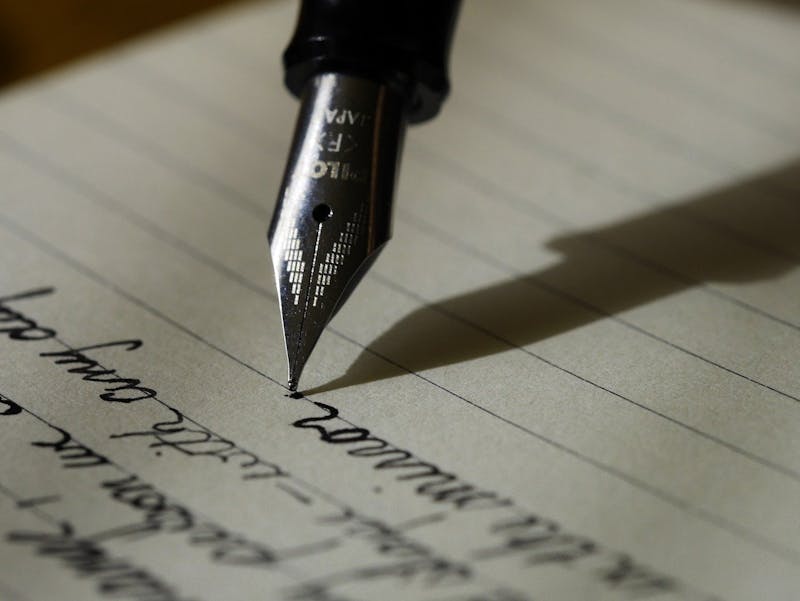Creative Writing Glossary
 By
Tricia Klos
By
Tricia Klos

Writing is as simple as putting pen to paper (or fingers to keyboard), right? Not always. When you're creating a short story or novel, it's important to think about who your protagonist is and why they're doing what they do. It's important to make sure that each word you use does what you want it to do. And it's extra-important to make sure that the climax is placed right where it belongs. When you're working with an editor, you may have to know these terms and more: They won't just be correcting your grammar, but also giving you feedback with words like "epilogue", "hook", and "narrator". You may need a glossary like this one to bring your story to the next level!
Archetype: An archetype is a character that represents a universal "symbol" in the world. For example, if your character is trying to save the world at great cost to themselves, they may fit the "hero" archetype.
Backstory: This is the story of a character's life before your story began. It can give depth to a character or guide their actions in the plot.
Characterization: The way you describe a character and give them life is characterization. This can consist of a word you chose to describe them or the actions they take.
Conflict: The main issue that the protagonist has to solve is the conflict of the story. This can be between characters or a larger conflict in the world. Resolving this is the point of the story.
Dialogue: Dialogue is the spoken words between characters. This can move the plot forward, add context, or add characterization. It's important to have a point for dialogue to exist in a story.
Dramatic Irony: Dramatic irony, one of the most common types of irony, happens when the reader is aware of a fact but the characters in the story are not.
Exposition: The first part of the plot is the exposition. It sets up the conflict, gives background on the universe and characters, and hooks the reader so they want to continue reading.
First Person: This is a point of view from which you can choose to tell your story. It changes the grammar and depth of the story and means you will be writing as if you are the character, e.g. "I saw my rival and ran toward him."
Genre: The category your story falls into is its genre. This can be general, like fiction, or specific, like steampunk dystopian science fiction.
Imagery: This is a general term covering the figurative language used in a work to add to the mood. If your imagery is gray and desolate, the mood may be bleak, for example.
Novella: A novella is a shorter written work than a novel, often around 17,500 to 40,000 words in length. Longer works are novels, while shorter works than novellas are short stories.
Passive Voice: Passive voice is an issue of grammar. This is when the subject of the sentence is acted on instead of doing the acting. "I scolded her" is active voice, while "She was scolded by me" is passive voice.
Plot: The plot is the events that take place in the story. Generally, this involves setting up and then resolving a conflict.
Protagonist: This is the main character in your story.
Setting: The setting is the time and place when the story is taking place.
Trope: A trope is a common, possibly overused, theme in a work. Tropes are often avoided or turned on their heads but can also signal to the reader what to expect from a character.
World-Building: This is how you create the setting the characters live in. It is especially important if your setting is anything other than the real world we live in.
Writing Resources
- A Writer's Guide to Point of View
- What Are Parts of a Plot's Exposition?
- Writing Character Backstory That Feels Real
- About Passive Voice
- What Is an Archetype?
- What Genre Is My Story?
- Narrative Elements: Characterization
- Five Ways to Create Conflict in Your Story
- What Are the Seven Types of Conflict in Literature?
- How to Write Dialogue in Fiction
- Your Guide to Writing Better Dialogue
- The Three Types of Irony
- 25 Ways to Plot, Plan, and Prep Your Story
- Seven Steps to Creating a Flexible Plot Outline for Any Story
- What Is a Protagonist?
- Protagonist and Antagonist: Beyond Hero and Villain
- The Top Ten Young Adult Tropes and How to Avoid Them
- How to Create a Believable World for Your Fiction Characters
Language Education Resources:
About the Author

Tricia Klos
Tricia Klos is a linguist and copywriter based in Barcelona, Spain. Born on a small farm in Wisconsin, she followed her passion for linguistics and culture to Europe in 2010 and has stayed there ever since. In addition to her bachelor’s degree in Linguistics and master’s degree in Marketing and Communication, she speaks (nearly) 4 languages: English, German, Spanish, and Korean. She’s a self-professed grammar nerd with a love for style guides and syntax. If you don’t find her with her nose buried in a book, you might catch her out on the road training for her next marathon.
Recent Clues
- Reason for a referee giving a penalty? (8) Crossword Clue
- Started (9) Crossword Clue
- Extremely obstinate Crossword Clue
- Old Celtic jewellery with a twist (4) Crossword Clue
- Suffering anguish from public school education Crossword Clue
- Before Sunday, for short Crossword Clue
- Tree has changed Crossword Clue
- Land of Lincoln varsity athletes Crossword Clue
- Passenger-screening org. Crossword Clue
- Celtic flag hoisted originally Crossword Clue
- Dines at home (4,2) Crossword Clue
- Resolve to put off excavation Crossword Clue
- Make happy Crossword Clue
- Scottish sweet - a medicinal dose (6) Crossword Clue
- Egg cell producers Crossword Clue
- "Finally!" Crossword Clue
- Cut in two (5) Crossword Clue
- A grand...or what "K" means in 50k Crossword Clue
- Underhanded move Crossword Clue
- Was humiliated Crossword Clue
- Baby Crossword Clue
- Open ___ night (comedy club offering) Crossword Clue
- Cut corners Crossword Clue
- Vats Crossword Clue
- Salt Lake City's state Crossword Clue
- Field yield Crossword Clue
- Metallic element of the rare earth group; symbol Dy (10) Crossword Clue
- Djinn Crossword Clue
- Let off steam Crossword Clue
- Skinflint Crossword Clue
- Skater Midori Crossword Clue
- "Neato!" Crossword Clue
- Medicinal plants; a sole (anag.) Crossword Clue
- Gratuity Crossword Clue
- "Disco" dude from "The Simpsons" Crossword Clue
- Guiding light to join tricksters? Crossword Clue
- Nauseate Crossword Clue
- Perform on stage, say Crossword Clue
- Look through a narrow opening Crossword Clue
- Stimulant making comeback, it's just the same Crossword Clue
- Left, on a liner Crossword Clue
- Podium Crossword Clue
- Artist's stand (5) Crossword Clue
- Dollar bills Crossword Clue
- Were Orwell's animals so stubborn? Crossword Clue
- Awareness of unusual things one wears Crossword Clue
- Sir's counterpart Crossword Clue
- Word that can redundantly follow "I" Crossword Clue
- Biblical beast Crossword Clue
- ___-Alt-Del (computer command) Crossword Clue
Trending Clues
- The outer part of a bird's wing (6) Crossword Clue
- Clear sky Crossword Clue
- *Evaluates Crossword Clue
- Weed in the nightshade family Crossword Clue
- Joined a mosh pit Crossword Clue
- The t's in "wattage"? Crossword Clue
- Wrestling style in which holds below the waist are prohibited (6-5) Crossword Clue
- Fusilli shapes Crossword Clue
- With 18-Across, annual lunar holiday Crossword Clue
- Electronic robot toy resembling an animal with hamster or owl-like features, which became a Christmas season favorite among kids Crossword Clue
- Actress Neuwirth Crossword Clue
- Nighttime parties Crossword Clue
- Stab Crossword Clue
- Precious multicolored rock Crossword Clue
- Ancient characters Crossword Clue
- Biblical grain measure Crossword Clue
- Diggs of "Private Practice" Crossword Clue
- Staunch advocate of a cause Crossword Clue
- Ghostbusters ___ Pack, which became a must-have Christmas gift toy for kids Crossword Clue
- ___ Talbot, actor who played "Sgt. Gelsey" in the film "Up in Arms" Crossword Clue
- Union suit? Crossword Clue
- Segments of Earth's lithosphere Crossword Clue
- "Over There!" writer Crossword Clue
- Little terrier Crossword Clue
- Struggled to gain traction Crossword Clue
- Pushkin's "Eugene --" Crossword Clue
- 2026 in the Chinese zodiac: 4 wds. Crossword Clue
- Earthy brown hue Crossword Clue
- Copy machine brand Crossword Clue
- Dubious bit of "protection" before a beach trip Crossword Clue
- Accepting kickbacks, say Crossword Clue
- Passes on some bread? Crossword Clue
- Litter member Crossword Clue
- "Tartuffe" writer Crossword Clue
- Colorful spherical trinket hung on the Christmas tree Crossword Clue
- French roll Crossword Clue
- New corp. hires Crossword Clue
- Military units Crossword Clue
- "Vendors ___ their trade every day on these streets." Crossword Clue
- "__, Macduff": Shakespeare Crossword Clue
- FedEx rival Crossword Clue
- Embroidery case Crossword Clue
- "Billy Budd" composer Crossword Clue
- Line judge's call Crossword Clue
- *Only woman to serve as prime minister of India Crossword Clue
- Launch Crossword Clue
- The e's in "breed"? Crossword Clue
- NYC airport Crossword Clue
- "Stop!," at sea Crossword Clue
- Fashion designer's studio Crossword Clue